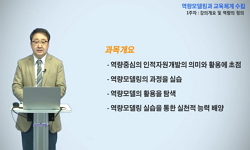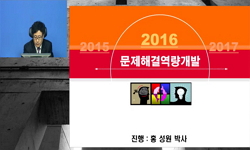Competency means a relatively long-lasting way of behavior and thinking as a personal internal property that generally appears in various situations. This study aimed at examining elements of competency necessary for leaders who lead innovation of a r...
http://chineseinput.net/에서 pinyin(병음)방식으로 중국어를 변환할 수 있습니다.
변환된 중국어를 복사하여 사용하시면 됩니다.
- 中文 을 입력하시려면 zhongwen을 입력하시고 space를누르시면됩니다.
- 北京 을 입력하시려면 beijing을 입력하시고 space를 누르시면 됩니다.
농촌지역 리더들이 지각한 리더십 효과성과 역량요소간의 관계성 연구 = The study for relationship between perceived leadership effectiveness of rural area leaders and competencies
한글로보기https://www.riss.kr/link?id=T11944701
- 저자
-
발행사항
춘천 : 한림대학교 대학원, 2008
-
학위논문사항
학위논문(석사) -- 한림대학교 대학원 , 심리학과 심리학전공 , 2008. 2
-
발행연도
2008
-
작성언어
한국어
-
주제어
역량 ; 리더십 효과성 ; 마을시민행동에 대한 리더지각 ; 리더만족에 대한 리더지각 ; 마을응집력에 대한 리더지각 ; 마을생산성에 대한 리더지각 ; 마을몰입 ; competency ; leadership effectiveness ; leader perception of a rural community citizenship behavior ; leader perception of leader satisfaction ; leader perception of a rural community cohesiveness ; leader perception of a rural community productivity ; a rural community commitment
-
발행국(도시)
강원특별자치도
-
형태사항
ix, 99 p. ; 26cm
-
일반주기명
지도교수:이주일
- 소장기관
-
0
상세조회 -
0
다운로드
부가정보
다국어 초록 (Multilingual Abstract)
Research 1 implemented semi-structured in-depth interviews with 10 leaders in successful rural communities to analyze cases collected and examine competency. As a result, 16 elements of competency were drawn for leaders in rural communities: effective communication, rural community formation, vision presentation, morality, devotion to a rural community, patience, positive thinking, internal locus of control, firm belief, passion for a rural community, wide personal relations, cultivation of talented people, continuous critical mind, self-development, problem-solving ability, and competency for understanding problems with a rural community. On the basis of these results, questionaries were developed to measure competency of rural community leaders.
Research 2 confirmed criterion-related validity and usefulness of competencies found in Research 1 through a quantitative test with a survey. As a result, a total of 11 competencies, including effective communication, rural community formation, morality, devotion to a rural community, positive thinking, firm belief, passion for a rural community, wide personal relations, cultivation of talented people, and problem-solving competency, had criterion-related validity confirmed, showing correlation with leadership effectiveness variables. The 16 competency elements had a significant amount of explanation about other remaining leadership effectiveness variables than the extent of external project attraction. These results generally supported the results of Research 1 and verified appropriateness of the developed scale. There were significant differences in leadership effectiveness by the upper and lower groups of competency, supporting the results of Research 1 as a whole.
Research 2 also examined relations between leadership effectiveness variables and leadership competency in rural communities as a sum of criterion-related questions. As a result, leadership competency in rural communities was significantly correlated with leader perception of rural community citizenship behaviors, leader perception of leader satisfaction, leader perception of rural community cohesiveness, leader perception of rural community productivity, and leaders' rural community commitment. There were also significant differences in leader perception of rural community citizenship behaviors, leader perception of leader satisfaction, leader perception of rural community cohesiveness, and leaders' rural community commitment by the upper and lower groups of leadership competency in rural communities.
Finally, discussion were held about theoretical suggestions and practical implication of this study and its limitations and future research tasks were presented.
Competency means a relatively long-lasting way of behavior and thinking as a personal internal property that generally appears in various situations. This study aimed at examining elements of competency necessary for leaders who lead innovation of a rural community recently faced with the crisis and opportunity of Korea-U.S. FTA and support by central and local governments, respectively. To do this, two researches were conducted.
Research 1 implemented semi-structured in-depth interviews with 10 leaders in successful rural communities to analyze cases collected and examine competency. As a result, 16 elements of competency were drawn for leaders in rural communities: effective communication, rural community formation, vision presentation, morality, devotion to a rural community, patience, positive thinking, internal locus of control, firm belief, passion for a rural community, wide personal relations, cultivation of talented people, continuous critical mind, self-development, problem-solving ability, and competency for understanding problems with a rural community. On the basis of these results, questionaries were developed to measure competency of rural community leaders.
Research 2 confirmed criterion-related validity and usefulness of competencies found in Research 1 through a quantitative test with a survey. As a result, a total of 11 competencies, including effective communication, rural community formation, morality, devotion to a rural community, positive thinking, firm belief, passion for a rural community, wide personal relations, cultivation of talented people, and problem-solving competency, had criterion-related validity confirmed, showing correlation with leadership effectiveness variables. The 16 competency elements had a significant amount of explanation about other remaining leadership effectiveness variables than the extent of external project attraction. These results generally supported the results of Research 1 and verified appropriateness of the developed scale. There were significant differences in leadership effectiveness by the upper and lower groups of competency, supporting the results of Research 1 as a whole.
Research 2 also examined relations between leadership effectiveness variables and leadership competency in rural communities as a sum of criterion-related questions. As a result, leadership competency in rural communities was significantly correlated with leader perception of rural community citizenship behaviors, leader perception of leader satisfaction, leader perception of rural community cohesiveness, leader perception of rural community productivity, and leaders' rural community commitment. There were also significant differences in leader perception of rural community citizenship behaviors, leader perception of leader satisfaction, leader perception of rural community cohesiveness, and leaders' rural community commitment by the upper and lower groups of leadership competency in rural communities.
Finally, discussion were held about theoretical suggestions and practical implication of this study and its limitations and future research tasks were presented.
국문 초록 (Abstract)
연구 1에서는 성공한 마을의 리더 10명을 대상으로 반구조화 된 심층면접을 통해 수집된 사례를 분석하여 마을리더의 역량을 탐색하였다. 그 결과 농촌지역 마을리더의 역량으로는 효과적인 의사소통, 마을공동체 형성, 비전제시, 도덕성, 마을에 대한 헌신, 인내심, 긍정적 사고, 내적통제사고, 확고한 신념, 마을에 대한 열정, 폭넓은 대인관계, 인재양성, 지속적인 문제의식, 자기계발, 문제해결능력, 마을문제파악역량 등 16가지의 역량이 도출되었다. 이상의 결과들을 토대로 지역의 마을리더 역량을 측정하는 문항들이 개발되었다.
연구 2에서는 설문조사를 통한 양적 검증을 통해 연구 1에서 발견된 역량들의 준거관련 타당도와 유용성을 확인해 보았다. 그 결과 효과적인 의사소통, 마을공동체 형성, 도덕성, 마을에 대한 헌신, 긍정적 사고, 확고한 신념, 마을에 대한 열정, 폭넓은 대인관계, 인재양성, 문제해결 역량 등 총 11가지 역량에서 리더십 효과성 변인들과 상관이 나타나 준거관련 타당도가 확인되었다. 또한 15가지 역량요소는 외부사업유치정도를 제외한 나머지 리더십 효과성 변인들에 대해 유의미한 설명량을 가지고 있었다. 이러한 결과들은 전반적으로 연구1의 결과를 지지하였으며, 개발된 척도의 적합성을 검증해 주었다. 또한 역량별 상, 하 집단에 따라 리더십 효과성에 유의미한 차이가 나타나 연구 1의 결과가 전반적으로 지지되었다.
아울러 연구 2에서는 준거관련 문항들을 합산한 농촌지역 리더십 역량과 리더십효과성 변인들간의 관련성도 살펴보았다. 그 결과 농촌지역 리더십 역량은 마을시민행동에 대한 리더지각, 리더만족에 대한 리더지각, 마을응집력에 대한 리더지각, 마을생산성에 대한 리더지각, 리더의 마을몰입과 유의미한 상관이 나타났다. 또한 농촌지역 리더십 역량의 상, 하 집단에 따라 마을시민행동에 대한 리더지각, 리더만족에 대한 리더지각, 마을응집력에 대한 리더지각, 리더의 마을몰입에서 유의미한 차이가 나타났다.
끝으로 본 연구의 이론적 시사점과 실용적 함의를 논하였고, 본 연구가 지니는 제한점 및 앞으로의 연구 과제를 제시하였다.
역량은 개인의 내적 특성으로서 다양한 상황에서 일반적으로 나타나며 비교적 장시간 지속되는 행동 및 사고방식을 말한다. 본 연구는 최근 한미 FTA와 중앙·지방 정부의 지원이라는 위기�...
역량은 개인의 내적 특성으로서 다양한 상황에서 일반적으로 나타나며 비교적 장시간 지속되는 행동 및 사고방식을 말한다. 본 연구는 최근 한미 FTA와 중앙·지방 정부의 지원이라는 위기와 기회를 맞아서 마을의 혁신을 주도하고 있는 리더에게 필요한 역량요소를 탐색하기 위하여 수행되었다. 이를 위해 두 가지의 연구가 진행되었다.
연구 1에서는 성공한 마을의 리더 10명을 대상으로 반구조화 된 심층면접을 통해 수집된 사례를 분석하여 마을리더의 역량을 탐색하였다. 그 결과 농촌지역 마을리더의 역량으로는 효과적인 의사소통, 마을공동체 형성, 비전제시, 도덕성, 마을에 대한 헌신, 인내심, 긍정적 사고, 내적통제사고, 확고한 신념, 마을에 대한 열정, 폭넓은 대인관계, 인재양성, 지속적인 문제의식, 자기계발, 문제해결능력, 마을문제파악역량 등 16가지의 역량이 도출되었다. 이상의 결과들을 토대로 지역의 마을리더 역량을 측정하는 문항들이 개발되었다.
연구 2에서는 설문조사를 통한 양적 검증을 통해 연구 1에서 발견된 역량들의 준거관련 타당도와 유용성을 확인해 보았다. 그 결과 효과적인 의사소통, 마을공동체 형성, 도덕성, 마을에 대한 헌신, 긍정적 사고, 확고한 신념, 마을에 대한 열정, 폭넓은 대인관계, 인재양성, 문제해결 역량 등 총 11가지 역량에서 리더십 효과성 변인들과 상관이 나타나 준거관련 타당도가 확인되었다. 또한 15가지 역량요소는 외부사업유치정도를 제외한 나머지 리더십 효과성 변인들에 대해 유의미한 설명량을 가지고 있었다. 이러한 결과들은 전반적으로 연구1의 결과를 지지하였으며, 개발된 척도의 적합성을 검증해 주었다. 또한 역량별 상, 하 집단에 따라 리더십 효과성에 유의미한 차이가 나타나 연구 1의 결과가 전반적으로 지지되었다.
아울러 연구 2에서는 준거관련 문항들을 합산한 농촌지역 리더십 역량과 리더십효과성 변인들간의 관련성도 살펴보았다. 그 결과 농촌지역 리더십 역량은 마을시민행동에 대한 리더지각, 리더만족에 대한 리더지각, 마을응집력에 대한 리더지각, 마을생산성에 대한 리더지각, 리더의 마을몰입과 유의미한 상관이 나타났다. 또한 농촌지역 리더십 역량의 상, 하 집단에 따라 마을시민행동에 대한 리더지각, 리더만족에 대한 리더지각, 마을응집력에 대한 리더지각, 리더의 마을몰입에서 유의미한 차이가 나타났다.
끝으로 본 연구의 이론적 시사점과 실용적 함의를 논하였고, 본 연구가 지니는 제한점 및 앞으로의 연구 과제를 제시하였다.
목차 (Table of Contents)
- 목차 = iii
- Ⅰ. 서론 = 1
- 1. 역량의 정의와 특성 = 2
- (1) 역량의 정의 = 2
- (2) 역량의 특성 = 3
- 목차 = iii
- Ⅰ. 서론 = 1
- 1. 역량의 정의와 특성 = 2
- (1) 역량의 정의 = 2
- (2) 역량의 특성 = 3
- 1) 내적 특성 = 3
- 2) 인과 관계 = 4
- 3) 준거참조 = 4
- 2. 농촌지역의 리더십 = 5
- (1) 일반적인 리더십의 정의 = 5
- (2) 농촌지역 리더의 역할과 정의 = 6
- (3) 성공한 농촌지역 리더들의 특성 = 8
- 3. 리더십 이론과 선행연구 = 10
- (1) 리더십 이론 = 10
- 1) 거래적 리더십 = 10
- 2) 변혁적 리더십 = 11
- 3) 서번트 리더십 = 12
- 4) 리더십 유형과 성공한 농촌리더의 역량요소 = 13
- (2) 리더십 유형과 리더십 효과성에 대한 선행연구 = 15
- 1) 거래적 리더십과 효과성 = 15
- 2) 변혁적 리더십과 효과성 = 15
- 3) 서번트 리더십과 효과성 = 16
- 4. 문제 제기 및 연구 과제 = 17
- Ⅱ. 연구 1 : 성공한 농촌지역 리더의 역량요소에 대한 질적 탐색 = 19
- 1. 연구 목적 = 19
- 2. 연구 방법 및 절차 = 19
- (1) 연구 대상 = 20
- (2) 연구 절차 = 21
- 3. 연구 결과 = 22
- (1) 각 역량별 하위 범주와 대표적인 사례 = 25
- 1) 영향력 역량군 = 25
- 가) 효과적인 의사소통 역량 = 26
- 나) 비전제시 역량 = 27
- 2) 대인관계 역량군 = 27
- 가) 마을공동체 형성 역량 = 28
- 나) 폭넓은 대인관계 역량 = 28
- 3) 마을효과성 역량군 = 29
- 가) 마을에 대한 헌신 역량 = 30
- 나) 마을에 대한 열정 역량 = 30
- 4) 개인특성 역량군 = 31
- 가) 인내심 역량 = 32
- 나) 확고한 신념 역량 = 33
- 다) 도덕성 역량 = 33
- 라) 긍정사고 역량 = 34
- 마) 내적통제사고 역량 = 35
- 5) 학습지향 역량군 = 35
- 가) 인재양성 역량 = 35
- 나) 자기계발 역량 = 36
- 6) 문제관리 역량군 = 36
- 가) 지속적인 문제의식 역량 = 37
- 나) 마을문제파악 역량 = 37
- 다) 문제해결능력 역량 = 38
- (2) 농촌 마을리더의 역량척도 개발 = 40
- Ⅲ. 연구2: 농촌지역의 리더십 효과성에 영향을 주는 역량의 양적 탐색 = 49
- 1. 연구 목적 = 49
- 2. 연구방법 = 50
- (1) 연구대상 = 50
- (2) 측정도구 = 51
- 1) 농촌 마을리더 역량문항 = 51
- 2) 리더십 효과성 지표 = 52
- 가) 리더십 효과성의 주관적 지표 = 52
- a) 마을시민행동 대한 리더의 지각 = 52
- b) 마을주민들의 리더만족에 대한 리더의 지각 = 53
- c) 주민 응집력에 대한 리더의 지각 = 53
- d) 마을생산성에 대한 리더의 지각 = 53
- e) 리더의 마을 몰입 = 54
- 나) 리더십 효과성의 객관적인 지표 = 54
- a) 외부사업 유치정도 = 54
- 3. 자료 분석 = 55
- 4. 연구 결과 = 55
- (1) 농촌지역 리더역량의 각 차원별 신뢰도와 기술 통계치 = 55
- (2) 농촌지역 리더가 지각한 리더십 효과성과 역량요소간의 관계 검증 = 56
- 1) 역량요소와 마을시민행동에 대한 리더지각과의 관계 = 61
- 2) 역량요소와 주민들의 리더만족에 대한 리더지각과의 관계 = 61
- 3) 역량요소와 마을응집력에 대한 리더지각과의 관계 = 62
- 4) 역량요소와 마을생산성에 대한 리더지각과의 관계 = 63
- 5) 역량요소와 리더의 마을몰입간의 관계 = 63
- 6) 역량요소와 외부사업유치 정도간의 관계 = 64
- (3) 각 역량요소의 상하집단별 리더십 효과성의 차이 검증 = 64
- (4) 준거관련 문항의 효과성 확인 = 68
- 1) 준거관련 문항의 확인 = 69
- 2) 리더십 역량의 신뢰도 분석 = 71
- 3) 리더십 역량과 리더십 효과성 변인과의 관계 검증 = 71
- 4) 리더십 역량의 상하집단별 리더십 효과성의 차이 검증 = 72
- 4. 논의 = 73
- Ⅵ. 종합논의 = 77
- 1. 연구 결과의 요약 = 77
- 2. 연구의 의의 = 78
- 3. 연구의 제한점 및 추후 연구를 위한 제안 = 79
- 참고문헌 = 81
- Abstract = 89
- 부록 = 92












